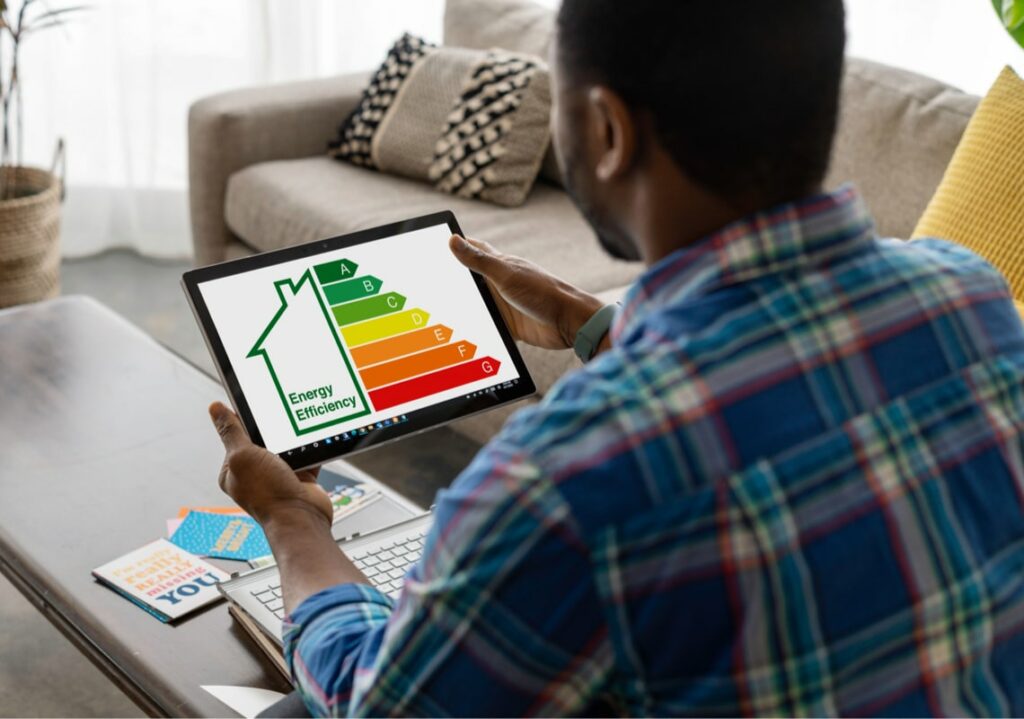As the UK’s energy crisis continues to unfold there has been a surge of interest among homeowners and landlords looking to improve the energy efficiency of their properties to benefit from reduced energy bills.
If you are looking to spend less on lighting and heating, then you’ll need to improve your property’s EPC rating. In this handy guide we look into the UK’s EPC system and reveal five simple steps you can take today to benefit from an energy efficient home that wastes less heat and energy.
What is an EPC rating?
In essence, an Energy Performance Certificate (EPC) measures your home’s energy efficiency on a scale of A to G, with A being the highest possible energy efficiency rating. To make things easier for homeowners, the rating scale is also colour coded from green to red to give you a better picture of how green your home is. The scale is similar to those stickers you’ll commonly see attached to home whitegoods, which indicate how much energy these appliances use during typical use.
To attain an updated EPC rating on your property you’ll need to book an appointment with an accredited assessor who will visit your home and look into your energy usage. During their on-site inspection, which typically lasts around an hour, the assessor will investigate the entire house, including your loft space if possible, to evaluate the whole building’s efficiency. The assessor will determine the potential for energy loss in each room of your house and consider any insulation materials installed, double glazing, and any other energy related measures being taken.
Each area of the house will receive an energy score depending on its efficiency. The overall EPC rating is then calculated based on the average score of the entire house. This means that if you receive an A rating for double glazing, but a G rating for insulation, your final EPC rating might lie somewhere in between. It’s important to note that the EPC does not factor in the running costs of appliances such as fridges, washing machines, dishwashers, etc.
Once issued, the EPC is valid for 10 years. Should you have an EPC that is older than this, you’ll need to apply for a new on before selling or renting your house.
The benefits of improving your EPC rating
An EPC rating provides insight into what steps you can take to make your house more energy-efficient to obtain a higher rating. Homeowners and landlords across the UK stand to benefit by improving their property’s EPC rating in the long run. Benefit include:
Reduce your energy bills
One of the most obvious benefits of working to improve the EPC rating of your home is a reduction in energy consumption, which will result in cheaper energy bills. The EPC will offer insights into how you can improve aspects of your home to make rooms more energy efficient. These changes are guaranteed to generate savings in running costs down the line.
Increase your property’s value
Carrying out improvements to boost your property’s Energy Efficiency Rating can increase your home’s value, enabling homeowners to up the asking price of their property by an average of 6%. Home buyers are increasingly looking to buy higher-rated properties to benefit from reduced energy bills. Currently, the average EPC rating for a dwelling in England and Wales is band D. Even an improvement to the next band can see property asking prices go up significantly.
Avoid fines
If you are a landlord looking to rent a domestic property, then by law it must currently achieve an EPC rating of E or above. This rule was previously only applicable for new tenancies but has now been updated to apply to all tenancies. Government has also proposed that all rental properties will need an EPC rating of ‘C’ or above by 2025. Failing to comply will result in fines between £500 and £5,000 based on the rateable value of the building.
Reduce your carbon emissions and help the environment
Aside from the personal benefits, a higher EPC rating is also good for the environment as it indicates that your home is releasing less carbon emissions into the atmosphere. In tangible terms this translates into a healthier environment with cleaner air.
5 simple EPC improvement tips
If you are looking to improve your property’s energy efficiency to benefit from an improved EPC rating, then here are six simple but effective steps you can take.
1 – Replace your boiler
If your home has an older inefficient boiler, this may have a significant impact on your energy efficiency. Switching to a new condensing boiler, which uses condensing technology to make better use of the heat the boiler generates from fuels such as gas or oil, can dramatically increase your EPC score by as much as 40 points. Considering that the standard threshold to achieve a better EPC is 39 points, this one simple change can reap big benefits to your home’s energy bills and EPC score. Couple this improvement with intelligent thermostats and radiator controls and you’ll boost your rating even further.
2 – Invest in double or triple glazing
Improving your home’s heating efficiency is all well and good. But if your home leaks a significant amount of warmth, then you won’t benefit as much from improved boilers and radiator usage. That’s why double and triple glazing is a must when looking to improve your EPC. It is estimated that new double glazing can improve your rating by as much as 10 points. Plus, it will make it much more difficult for heat to escape from your property.
3 – Get a smart meter
Often, we become so entrenched in our daily habits that we don’t really notice how our energy usage is costing us big time. A simple but effective solution to improve energy usage around the home is by getting a smart meter. While this won’t directly improve your energy efficiency, a meter will paint a much clearer picture of where energy savings can be made around the house. This will help you make informed decisions on appliances that need upgrading and small changes that will leave a positive impact on your energy bills.
4 – Upgrade your lighting
Upgrading your old halogen and incandescent light bulbs with light-emitting diodes (LEDs) is another great way to significantly improve your energy efficiency around the house. LEDs are highly efficient and have a long lifespan. Better yet, this is a really low-cost change that can reap big results in the long run.
5 – Invest in insulation
Without a doubt, one of the best ways to improve your EPC and maximise heat retention is to invest in insulation, especially in well-known heat-loss areas, such as walls, floors, and lofts. On average, installing floor and loft insulation can reduce heat loss in each respective area of the home by as much as 25%. While wall insulation, whether cavity or solid, can save an additional 35%. There are numerous insulation materials available on the market, the adequacy of which will depend on your property and requirements. It’s always recommended to speak to an insulation expert first in order to identify the best insulation solutions to improve your EPC rating by the largest margin.



